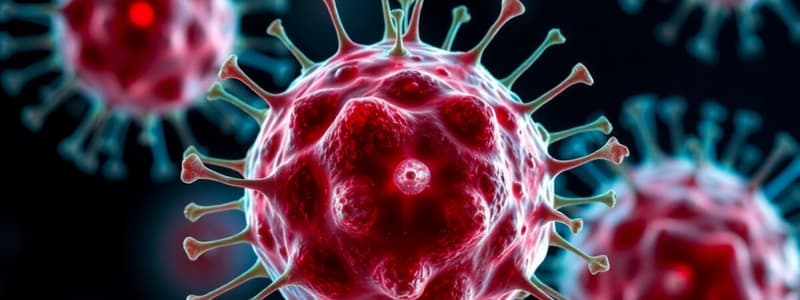Podcast
Questions and Answers
What is primarily characterized by reversible proliferation of altered cells?
What is primarily characterized by reversible proliferation of altered cells?
- Metastasis
- Progression
- Promotion (correct)
- Initiation
Which of the following factors is NOT considered a promoting agent in cancer development?
Which of the following factors is NOT considered a promoting agent in cancer development?
- Dietary fat
- Genetic mutations (correct)
- Cigarette smoking
- Obesity
What is the significance of the immune system in relation to cancer patients?
What is the significance of the immune system in relation to cancer patients?
- It does not influence cancer progression.
- It helps to identify and fight cancer cells. (correct)
- It only responds to bacterial infections.
- It exacerbates cancer growth directly.
Which stage of cancer development is marked by a notable increase in growth rate and invasiveness of tumors?
Which stage of cancer development is marked by a notable increase in growth rate and invasiveness of tumors?
Which of the following sites is commonly associated with metastasis from colon cancer?
Which of the following sites is commonly associated with metastasis from colon cancer?
Which statement best describes the role of co-carcinogens?
Which statement best describes the role of co-carcinogens?
How does the immune system differentiate between self and non-self?
How does the immune system differentiate between self and non-self?
What is a key factor in cancer prevention according to the stages of cancer development?
What is a key factor in cancer prevention according to the stages of cancer development?
What types of genetic abnormalities are associated with cancer?
What types of genetic abnormalities are associated with cancer?
Which cancers are linked to inherited genetic mutations across generations?
Which cancers are linked to inherited genetic mutations across generations?
What lifestyle factor is associated with an increased risk of breast cancer in postmenopausal women?
What lifestyle factor is associated with an increased risk of breast cancer in postmenopausal women?
Which dietary component is recognized as a potential risk factor for cancer?
Which dietary component is recognized as a potential risk factor for cancer?
What impact does a sedentary lifestyle have on cancer risk?
What impact does a sedentary lifestyle have on cancer risk?
Which hormonal agent is recognized as a risk factor for clear cell adenocarcinoma?
Which hormonal agent is recognized as a risk factor for clear cell adenocarcinoma?
Which of the following cancers is associated with obesity?
Which of the following cancers is associated with obesity?
Which cancers are thought to depend on endogenous hormonal levels for growth?
Which cancers are thought to depend on endogenous hormonal levels for growth?
What is the role of immune surveillance in relation to neoplastic cells?
What is the role of immune surveillance in relation to neoplastic cells?
What does cancer immunoediting refer to?
What does cancer immunoediting refer to?
How can cancer therapies negatively impact the immune system?
How can cancer therapies negatively impact the immune system?
What is a consequence of angiogenesis in the context of cancer?
What is a consequence of angiogenesis in the context of cancer?
How does cancer affect the bone marrow?
How does cancer affect the bone marrow?
What is concomitant immunity?
What is concomitant immunity?
What percentage of all cancers worldwide is estimated to be linked to viral infections?
What percentage of all cancers worldwide is estimated to be linked to viral infections?
Which cancer treatments are more likely to damage the immune system?
Which cancer treatments are more likely to damage the immune system?
What is the purpose of clinical staging in cancer treatment?
What is the purpose of clinical staging in cancer treatment?
Which stage of cancer indicates that the cancer is still confined to its origin?
Which stage of cancer indicates that the cancer is still confined to its origin?
What does the term 'restaging' refer to?
What does the term 'restaging' refer to?
Which of the following stages is typically classified as advanced or metastatic cancer?
Which of the following stages is typically classified as advanced or metastatic cancer?
What are the Karnofsky Performance Scale and the Katz Index used for?
What are the Karnofsky Performance Scale and the Katz Index used for?
At which stage is cancer commonly referred to as early-stage cancer?
At which stage is cancer commonly referred to as early-stage cancer?
What is a key factor for increasing survival rates in cancer patients?
What is a key factor for increasing survival rates in cancer patients?
Which stage of cancer generally means that the cancer has spread to lymph nodes but not to other parts of the body?
Which stage of cancer generally means that the cancer has spread to lymph nodes but not to other parts of the body?
What behavior differentiates cancer cells from normal cells in terms of cell boundaries?
What behavior differentiates cancer cells from normal cells in terms of cell boundaries?
Which tissue has a rapid rate of cell proliferation?
Which tissue has a rapid rate of cell proliferation?
What term describes the time needed for a tumor mass to double in size?
What term describes the time needed for a tumor mass to double in size?
What process leads cells to become specialized in structure and function?
What process leads cells to become specialized in structure and function?
What is NOT a characteristic of cancer cells in relation to cell differentiation?
What is NOT a characteristic of cancer cells in relation to cell differentiation?
What happens to the potential for cells to perform functions as they differentiate?
What happens to the potential for cells to perform functions as they differentiate?
Which type of genes are important regulators of normal cell processes and promote growth?
Which type of genes are important regulators of normal cell processes and promote growth?
What is indicated by the term 'pyramid effect' in relation to tumors?
What is indicated by the term 'pyramid effect' in relation to tumors?
Flashcards are hidden until you start studying
Study Notes
Cancer Cell Behavior
- Normal cells respect boundaries and do not invade other cells' territory.
- Cancer cells lose contact inhibition and grow on top of each other and normal cells.
- Normal cell proliferation rates vary by tissue, with some tissues like bone marrow having rapid rates.
- Cancer cells proliferate at the same rate as their originating tissue but respond differently to regulatory signals.
- This leads to continuous, indiscriminate growth, often producing more than two cells during mitosis.
- This continuous growth is termed the pyramid effect.
- The doubling time of a tumor mass is the time it takes to double in size.
Defect in Cell Differentiation
- Cell differentiation is the process of cells specializing in structure and function.
- It's a progression from immaturity to maturity, with cells gaining specific functions.
- Although all cells have the potential for all body functions, it's repressed during differentiation.
- Differentiated cells are stable and do not normally dedifferentiate.
Genetic Link
- Cancer involves malfunctioning genes that control differentiation and proliferation.
- Protooncogenes are normal genes that regulate cell growth.
- Mutations in protooncogenes can lead to uncontrolled growth.
- Tumor suppressor genes, like p53, normally suppress tumor formation.
- Mutations in these genes can contribute to cancer development.
Stages of Carcinogenesis
- Initiation is the irreversible alteration of a cell's DNA, leading to a genetic mutation and potential for tumor formation.
- Promotion is the reversible proliferation of the altered cells, often due to repeated exposure to promoting agents, which can be environmental factors or lifestyle choices.
- Progression is the final stage, characterized by increased tumor growth rate, invasiveness, and metastasis.
- Metastasis refers to the spread of cancer cells to distant locations.
Role of the Immune System in Cancer
- The immune system defends the body against disease and infection through the identification of foreign antigens.
- This is known as Immune Surveillance.
- Cancer cells can express tumor-specific antigens, making them recognizable by the immune system.
- Cancer immunoediting occurs when the environment surrounding neoplastic cells influences their growth.
- The immune system has anti-cancer mechanisms but may not be sufficient to eliminate tumors completely.
- Cancer treatments can suppress the immune system by reducing white blood cell production.
- Angiogenesis, the formation of new blood vessels, is an intrinsic response to neoplastic cells, but can provide a rich blood supply for tumor growth.
- Cancer can damage the bone marrow, reducing blood cell production and weakening the immune system.
- The immune system also influences metastasis.
Cancer Etiology
- Cancer risk is increased by factors like:
- Viral infections
- Bacterial Infections
- Genetic abnormalities
- Environmental toxins
- Lifestyle factors
- Hormonal agents
Cancer Prevention and Early Detection
- Emphasizing healthy lifestyles and reducing risk factors are key to preventing cancer.
- Early detection is crucial for improved survival rates.
- Teaching individuals about self-examination and warning signs promotes early intervention.
Cancer Staging
- Stage 0: Cancer in situ, confined to the origin site.
- Stage I: Cancer has not spread deeply, no lymph node involvement.
- Stage II & III: Cancer has grown deeper, potentially involves lymph nodes, but not other parts of the body.
- Stage IV: Metastatic cancer, spread to distant organs.
TNM Staging System
- T: Tumor size and extent of spread
- N: Involvement of lymph nodes
- M: Presence of metastasis
- The TNM staging system is used to classify cancer severity and guide treatment decisions.
Studying That Suits You
Use AI to generate personalized quizzes and flashcards to suit your learning preferences.



